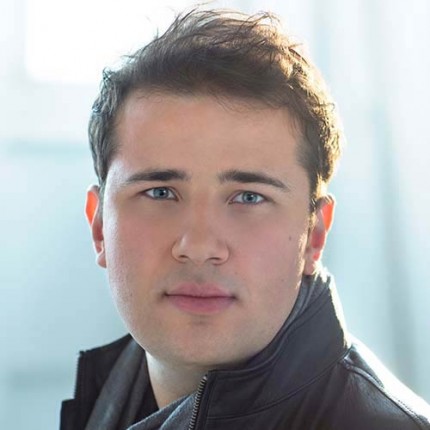Khristenko brings fitful Russian flair to American program
Pianist Stanislav Khristenko made his Ravinia Festival debut Sunday night at Bennett Gordon Hall. He performed an all-American program which he referred to as “Music of the New World,” bringing his Russian sensibilities to this repertoire with variable results.
Khristenko began with the Ravinia premieres of two works by Louis Gottschalk, America’s greatest nineteenth-century virtuoso pianist-composer. The thundering opening notes of Bamboula, danse des nègres boomed from Khristenko’s left hand, launching the performance with gusto. The piece itself is not exactly a masterwork, and while Khristenko artfully navigated its contrived transitions between jaunty Creole textures and rhapsodic interludes, the unvaried repetitions pall after awhile.
The ensuing Le banjo, esquisse americaine was a showcase of Khristenko’s prodigious technique. He expertly executed the work’s rapid-fire repeated notes in a convincing imitation of banjo strumming, which combined with open harmonies evocative of the American West to create a more compelling musical sketch.
Khristenko’s best outing of the evening was in Samuel Barber’s Piano Sonata, Op. 26. He imbued the piece’s martial opening with apt gravitas, and throughout the technical demands of the first movement never lost the thread of Barber’s underlying counterpoint. The impish Scherzo was fleet and dexterous, evaporating in an ethereal diminuendo, and the Adagio third movement expressed palpable anguish. In the last movement—a jagged fugue—Khristenko again brought his technical acumen to bear, playing with a defiant energy, sonorous bass, and creating a massive wall of sound at the work’s conclusion.
Two selections from Metamorphosis by Philip Glass followed intermission. Unfortunately Glass’ distilled sonic language in these works was contrasted with a wide spectrum of rude audience interruptions: program books slapped to the floor at every harmonic node, a jangling cell phone, and coughs melded with audible conversations. Through these myriad disruptions Khristenko was unflappable, and his poised, austere rendition would have allowed Glass’ music to speak volumes had the distractions not broken its hypnotic spell.
Khristenko closed his program with another work receiving its first performance at Ravinia, George Gershwin’s Song Book. Gershwin himself created this collection in 1932 at the behest of publisher Simon and Schuster, and its brief excerpts are based on the composer’s own improvisatory renditions of his most popular songs.
Khristenko performed the works in an order substantially different from that in the printed program, leaving anyone not intimately familiar with Gershwin’s corpus of songs adrift. More problematic was the lack of idiomatic swing to the playing. Gershwin indicated in his preface to the collection that, “The rhythms of American popular music are more or less brittle; they should be made to snap.
Khristenko’s interpretation lacked this quality, as well as an essential swing and spontaneity. His rubato was seldom organic, and he routinely glossed over the rhythmic and harmonic idiosyncrasies that give this music its unique feel. The pianist’s race through the closing “I Got Rhythm” was a blur, losing the music’s natural syncopations.
Khristenko fared much better in his encore of Schumann’s song Widmung, arranged by Liszt, offering an elegant rendition that did justice to the pianist’s consummate musicianship.
Cellist Alisa Weilerstein performs Britten’s Tema “Sacher,” Bach’s Cello Suites Nos. 1 & 3, and Kodály’s Sonata for Solo Cello 6 p.m. Monday at Bennett Gordon Hall. ravinia.org
Posted in Uncategorized





